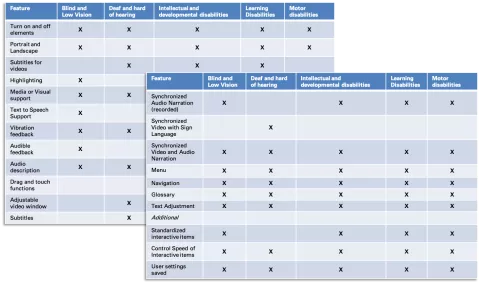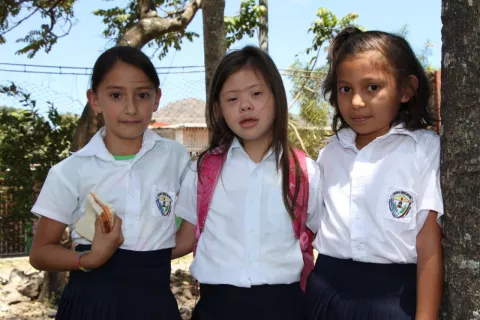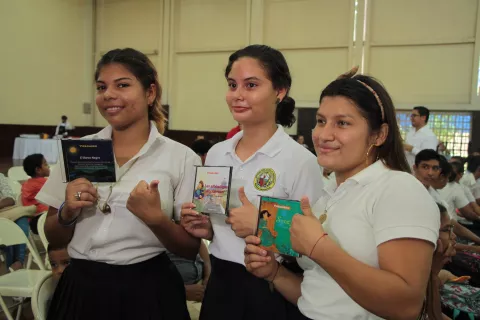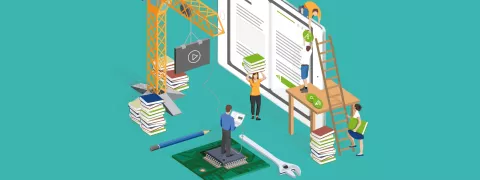Piloto de Uruguay
Producir el primer libro de texto de alfabetización digital accesible de Uruguay para educación primaria
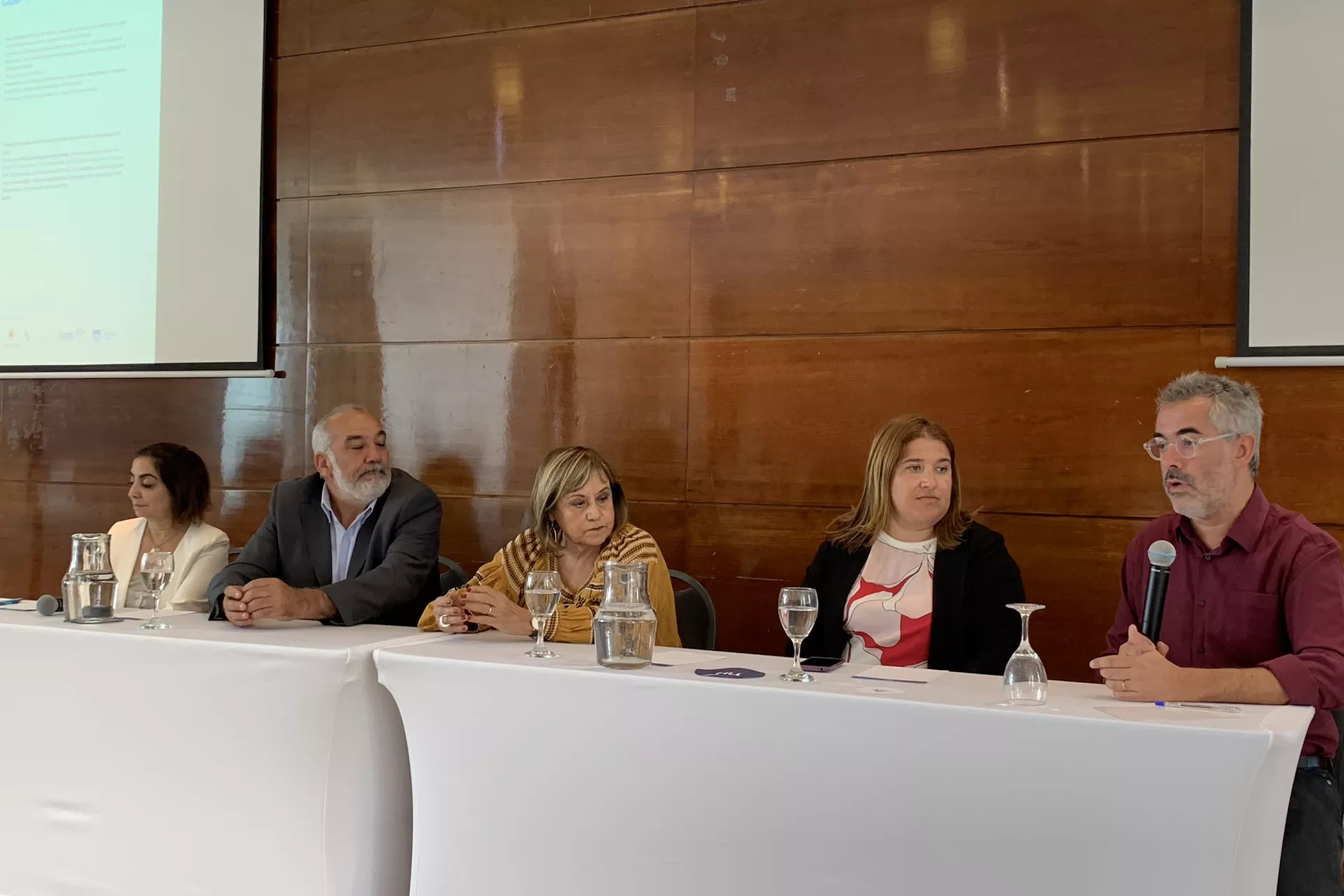
- Disponible en:
- English
- Español
In the strategy towards producing accessible digital textbooks, Uruguay plays a role model to design, manage and facilitate the development of accessible books.
According to data, in a country with a population of 3.500.000, there are 47,799 children and adolescents with disabilities (2011 census, INE) which is equivalent to 5.6 % of children and adolescents from 0 to 17 years of age.
The educational policy strategy in Uruguay has greatly advanced in focusing on inclusive education, with projects such as Inclusive Schools and Kindergartens Network - Mandela Network, the Mandela High Schools Pilot Project and the Inclusive Education Course for Primary and Middle School Teachers. UNICEF has been collaborating in all of these initiatives.
Another outstanding local aspect is that production, editing and distribution of primary school textbooks is state owned and is run by the ANEP; therefore, management of the process is not brokered by a publisher or a company. Lastly, and most important, we point out to the CEIBAL Programme through which all children and adolescents attending public schools, as well as the entire teaching staff, have a tablet or “ceibalita”.
Goals of the pilot:
- Convene a working group composed of government authorities, decision makers, technologists and education specialists to reach an agreement on a global strategy for the design and promotion of accessible digital materials;
- Develop a road map for the creation of an accessible digital textbook in Uruguay;
- Create a working team with decision makers, content developers and technologists to produce the first accessible digital textbook;
- Produce the first accessible digital textbook.
Activities:
- Call for methodology presentation workshops and a work group;
- Road map agreement as well as counterparts working agreement;
- Building a weekly working group for the design and adaptation of textbooks’ content and information in all four learning styles;
- Software concretion and production of the accessible book’s first chapter
- Validation through school groups;
- Taking decisions based on testing towards accessible textbooks’ production and concretion;
- Public launching.
Recording short term plan and process towards concretion
Activity 1.a - Working group to reach agreement on a global strategy for the design and promotion of accessible digital material
On February 11th and 12th, the Universal Accessible Digital Textbooks Workshop organized by CEIP and UNICEF took place. A working group was formed including UNICEF Uruguay authorities as well as CEIP, CEIBAL , MEC, PROLEE , CIVIL SOCIEY ORGANIZATIONS, TEACHERS AND TECHNOLOGISTS.
The activity’s goals were:
- Including the activity in the global strategy for accessible textbooks production framework;
- Generating a space to build a common strategy agreed upon by key actors and decision makers, from public bodies and civil society organizations, that are able to contribute to the strategy;
- Form the group in charge of implementing the first steps;
- Agreeing on a road map to move forward in developing accessible digital textbooks that contribute to inclusive quality education;
- Formalizing the road map to generate first steps.
3.1 - Building a weekly working group for the design and adaptation of textbook’s content and information
Since the end of March and after the launching day and cooperation agreement for the creation of universal accessibility multi-format textbooks, the CLE 1 began analyzing, revising and developing with key referents from CEIP, PROLEE, CEIBAL and UNICEF.
PROLEE led the CLE text revision and adaptation process for multi-format production. They produced and validated graphic, narrative and text modifications.
There was a call From CEIP, basically from the Special Education Area, for special teachers in different sub-areas that studied and produced adaptations and modifications in accordance to each sub-area’s necessary requirements to accessible textbooks.
CEIBAL and UNICEF participated providing a technical outlook on the materials’ adaptation process to making a digital product possible, ensuring that accessibility-for-all and quality criteria were fulfilled, as well as making it possible to produce multi-format on digital support.
1st milestone: chapter production and testing
The process, which took 14 working sessions, finished its first phase in early June. Work evolved around a series of general directions: working on a CLE 1 module along with the different sub-areas so as to produce a text that can be used by all children, with or without specific disabilities, given that different adaptations will allow the child to choose the format that best suits his or her needs (the audio-description of images, simplified language, Uruguayan Sign Language)
The methodological proposition for this phase in interaction with the different sub-areas was to be able to identify specific guidelines to elaborate any content design to produce multi-format universal accessibility books. The group elaborated one product – CLE First chapter- that combined the accessible content.
The process continued with producing the entire book in accessible formats. To this end, a call for tender was made to companies to create an accessible book fully accessible. It will result in a very powerful tool for all teachers in the country since it will facilitate classrooms where diversity is respected, and that will promote differentiated supports, managing each student’s requirements and learning styles and sustaining the same level of achievement for all children.
Once this is produced and installed in CEIBAL, it will be validated within several school groups, and corrections and modifications will be made if needed. It will also go through a validation process within the inclusive education course framework, coordinated by CEIP-UNICEF and FLACSO.
2nd milestone: Producing the entire book, promoting and training of all teachers for classroom implementation /November 2019-August 2020
By early 2020, we envisage having the first accessibility multi-format textbook: a tool to design school work, in and outside the classroom, from a universal design for learning perspective. This will be a new milestone in the journey towards inclusive education.
This second stage implies three lines of action:
- PRODUCTION AND PUBLIC PRESENTATION OF THE FIRST ACCESSIBLE DIGITAL TEXTBOOK
a) Finalizing the production of the fist accessible digital literacy textbook (to be achieved taking into account the insight provided by the evaluation and validation of users, including teachers and students).
b) Presenting the proposal to the public.
- PROMOTION AND TEACHER TRAINING ON TEXTBOOK USE IN THE CLASSROOM
a) Promoting and making sure the digital textbook and 3D printed material reach 100% of the country’s 2,364 schools.
- Implementing a teacher training proposal through CEIP’s inspectors and each state representative.
- Organizing regional workshops on the exchange of new teaching strategies for classroom use from a universal design for learning perspective.
- BOOK EVALUATION BY THE USERS: TEACHERS AND CHILDREN
a) Creating an evaluation form in order to evaluate the book’s use and possibilities;
b) Creating some focus groups to identify feedback on use, learning, challenges, etc.

